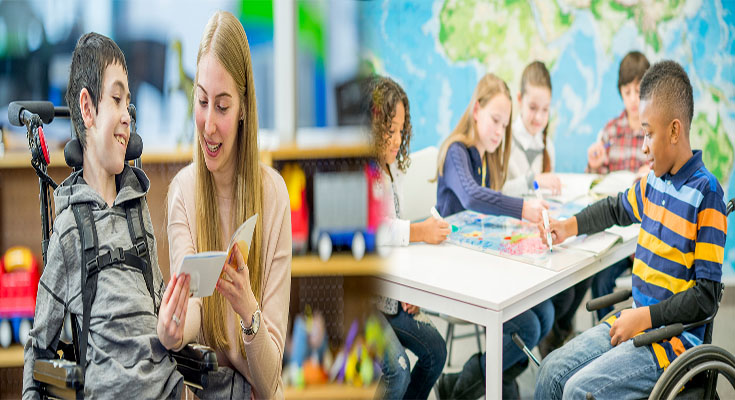Inclusive education is a way of teaching that allows all students to learn in an environment where they can feel comfortable, included and important. It allows special needs children to learn side-by-side with their peers. The benefits of inclusive education include better results, higher levels of motivation, improved social skills and reduced anti-social behaviour. Children who are taught in an inclusive environment are more likely to attend university and hold down well paid jobs in the future. There is a greater chance that children will be able to return home after school.
Inclusive education is a way of teaching that allows all students to learn in an environment where they can feel comfortable, included and important.
Inclusive education is a way of teaching that allows all students to learn in an environment where they can feel comfortable, included and important.
Inclusive education should not be confused with special needs or special education (also known as remedial). Inclusive education is often used when referring to schools with children who have various disabilities such as autism spectrum disorder (ASD), ADHD or dyslexia. These children may have additional support needs that need to be met by teachers and other professionals working within the school system.
It allows special needs children to learn side-by-side with their peers.
Inclusive education is a way of teaching that allows all students to learn in an environment where they can feel comfortable, included and important. The main idea behind inclusive education is to create an environment where all students are given the opportunity to participate fully in their learning. In many cases this means removing physical barriers that prevent students from taking part in mainstream classes or activities, such as wheelchairs or communication devices.
Inclusive education also involves changing attitudes towards disability so that everyone sees themselves as equal members of society regardless of whether they have special needs or not.
The benefits of inclusive education include better results, higher levels of motivation, improved social skills and reduced anti-social behaviour.
Inclusive education is a vital tool for building a better, more inclusive society. It helps children learn to respect and value each other’s differences, which in turn helps them develop into well-rounded adults who will contribute positively to the world around them.
Inclusive schools are more likely to have higher academic achievements than their mainstream counterparts. They also tend to have lower levels of anti-social behaviour and bullying because everyone feels like they belong there – even those with special needs or disabilities!
Children who are taught in an inclusive environment are more likely to attend university and hold down well paid jobs in the future.
Inclusive education is a good thing. It helps children to learn, develop social skills, and make friends. These are all important things for a child to do if they want to be successful in the future.
Inclusive education will help your child get into university by making them better at schoolwork so that they can go on to do well in their A levels or GCSEs (General Certificate of Secondary Education). Then when they go onto university, they will be more likely get a good job after graduation because they know how to work well with other people – which is something employers look for when hiring new employees!
There is a greater chance that children will be able to return home after school.
The home-school link is a vital part of education, and its importance should not be underestimated. Children who have positive relationships with their teachers are more likely to achieve higher grades in school and go on to further education. They are also more likely to have fewer emotional problems, be happier overall and make friends easily. This can be seen through the impact on children’s mental health: when children have an excellent relationship with their teacher at school they are less likely to suffer from anxiety or depression later on in life (Woods & McNamara 2017). Similarly, if parents feel trusted by their child’s teachers then this will help them feel more confident about raising them (Baxter 2014), which could lead onto better self-esteem for both parent and child when interacting together outside of the classroom environment too!
Inclusive education is good for everyone
Inclusive education is good for everyone. It’s an approach to learning that allows all children to participate, regardless of their abilities or disabilities. Inclusive education can be achieved through a variety of methods, such as:
- Adaptive technology (like text-to-speech software)
- Differentiated instruction (teaching students at different levels within the same classroom)
- Individualized student plans (putting together customized plans for each student)
Inclusive education benefits everyone involved in the process–from teachers and parents to administrators and classmates. Students will feel included and important when they’re able to learn alongside their peers with special needs; this sense of belonging helps them thrive academically and socially throughout their lives. Plus, inclusive classrooms provide opportunities for collaboration between teachers who specialize in different areas of expertise (like English vs math), which results in better outcomes for everyone involved!
Inclusive education is a great way to teach students and it benefits everyone. It allows special needs children to learn side-by-side with their peers, which helps them feel included and important. Inclusive education also leads to better results, higher levels of motivation, improved social skills and reduced anti-social behaviour. Children who are taught in an inclusive environment are more likely to attend university later on in life and hold down well paid jobs





